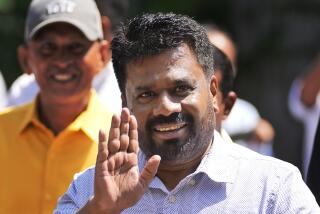Thailand Vote Not Likely to Resolve Impasse
- Share via
BANGKOK — Prime Minister Thaksin Shinawatra’s party appeared to win an easy reelection victory Sunday, but the one-sided vote resulting from a boycott by opposition parties did little to end Thailand’s 2-month old political crisis.
Unofficial early returns indicated that some of the parliament’s 500 seats would go unfilled as a result of the boycott, which could undermine the new legislature’s constitutional authority to convene and elect a prime minister.
Thaksin, in his second term as prime minister, called the election three years early in the hope of ending a mounting campaign to force him from office.
Opposition groups, which accuse the prime minister of corruption, have staged daily protests outside his Bangkok office for weeks. They say Thaksin abused his position by selling his family’s $1.9-billion stake in a holding company days after parliament passed a law exempting such a sale from taxes, saving his family an estimated $667 million.
Thaksin, who had pledged to step down if his party received less than 50% of the nationwide vote, canceled a Sunday evening news conference and made no comment on the early results.
Two English-language daily newspapers, the Bangkok Post and the Nation, reported today that Thaksin was disappointed with his party’s showing and was considering giving up his post.
Earlier, the prime minister called on his rivals to honor the results of the election.
“If they don’t respect the people’s decision, this is going to be a nightmare for the country,” he said before the vote.
Thaksin’s party was poised to become the only one in parliament.
None of the three main opposition parties fielded candidates in the election. Adopting the slogan “Vote for No Vote,” they urged voters to go to the polls and mark an abstention box on the ballot.
As a result, Thaksin’s Thais Love Thais party candidates ran unopposed in 278 of the 400 seats that are filled by direct election. One hundred members of parliament are selected from party lists based on national vote totals.
In some districts in Bangkok and southern Thailand, where Thaksin is especially unpopular, early returns indicated that his party’s candidates would not receive 20% of the eligible vote, the minimum required for a candidate to win.
In one district, there was no candidate, after the Thais Love Thais contender suddenly quit to become a Buddhist monk.
Opposition leaders say the constitution does not allow a new parliament to convene until every seat has been filled.
Thaksin could call new elections in selected districts, but that could mean the government would remain in limbo for months.
“People will not accept this election, and the political situation will get worse,” warned Banharn Silpa-archa, the former prime minister who leads the Thai Nation party, one of the three boycotting the vote.
Thaksin, a billionaire who swept to power in 2001, has served longer than any prime minister since Thailand became a constitutional monarchy in 1932.
He remains immensely popular among rural voters, who have benefited most from his populist healthcare and village finance programs. Only a year ago, his party won a landslide reelection, taking three-quarters of the seats in parliament.
But the former police officer is widely disliked by educated, urban voters who object to his domineering style and contend that he has used his position to enrich himself and his allies.
He also is highly unpopular in the Muslim-majority southern provinces, where the military’s brutal attempts to suppress an Islamic insurgency have alienated much of the population.
After the polls closed, three bombs exploded near polling stations in the southern province of Narathiwat as ballots were being removed for counting. At least two soldiers and a police officer were injured.
The election otherwise was largely peaceful, perhaps in part because of a 36-hour ban on the sale of alcohol in public places that began Saturday evening.
“This election is very important for the direction of the country because there is a split right now,” Thaksin told reporters after casting his ballot in Bangkok. “Voting is the responsibility of everyone who loves democracy. They must come out and vote.”
More to Read
Sign up for Essential California
The most important California stories and recommendations in your inbox every morning.
You may occasionally receive promotional content from the Los Angeles Times.












